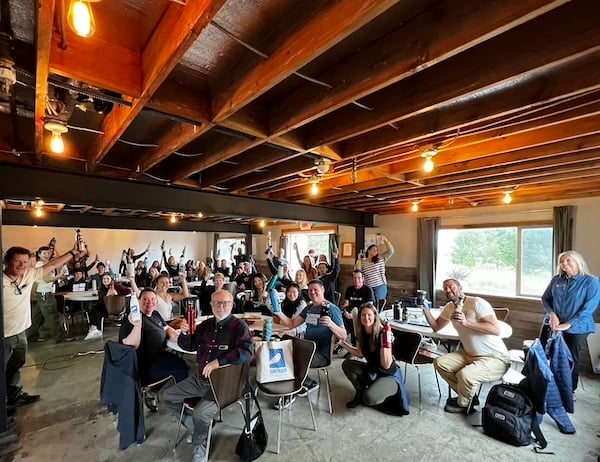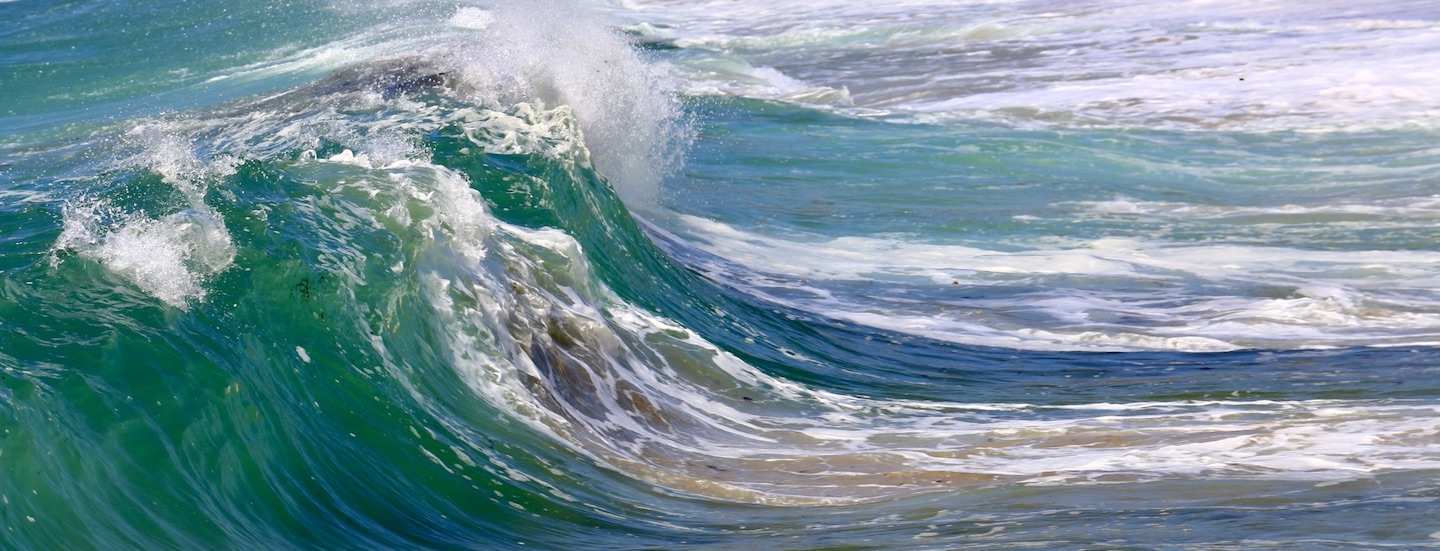
Closeout /kləʊzaʊt/ - noun: a wave formation that breaks all at once, not allowing for a smooth, rideable transition
This is what the end of the year always feels like - I'm cruising along, hoping to ride that last wave to the metaphorical shore, expecting a smooth, easy transition from one year to the next as people start checking out for the holidays. Then boom - closeout - the wave crashes suddenly, and that easy ride to the beach becomes a panicked paddle through the whitewash as deadlines loom and holiday break beckons.
But that's life/the ocean for you. Never a dull moment.
As the sun sets on another remarkable year, we at Surfrider Washington can't help but reflect on the incredible journey we've shared with our amazing community of ocean advocates and water recreation enthusiasts. This year has felt like a steadily building swell, full of new faces, fresh energy, epic cleanups, hard-earned victories, frustrating setbacks, and an overall sense of urgency to act balanced by the hope our activist network inspires. So let's take a moment to celebrate everything our volunteers' collective commitment to protecting our coastlines has accomplished this year!
Highlights of 2023:
- Chapters removed over 25,000 lbs of debris (over 135,000 lbs if you include all the cleanup efforts of our partners at Coastsavers!)
- Double campaign victories for the Coast & Climate
- Passage of the Trifecta Plastics Bill addressing three common sources of pollution
- Successful Coastal Recreation Hill Days advocating for federal policies
- Highest attended Cascadia Chapter Leadership Conference in PNW history
- Hired our new Policy Manager, Pete Steelquist
- New regional and chapter websites
Plastic Pollution: Turning the Tide
Our plastic pollution initiative continues to have a real impact in our state. From beach cleanups to Ocean Friendly Businesses to policy solutions, our volunteers are leading the charge to stop plastic pollution at its source.
Beach Cleanups: More Than Just Removing Trash
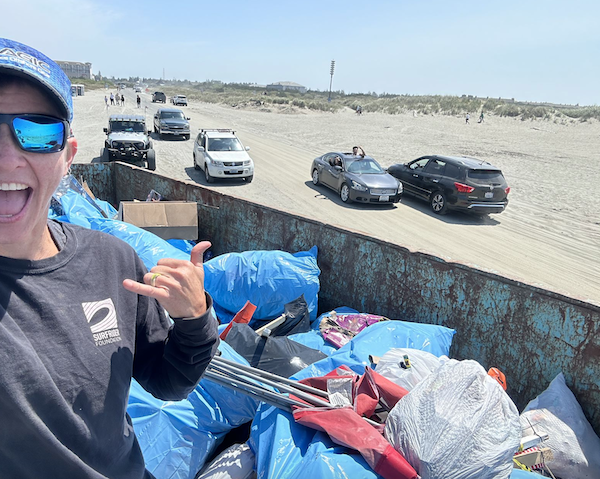
Me in a dumpster (insert 'where I belong' joke) on our coastwide July 5th cleanup that resulted in over 110,000 lbs of debris removed from our beaches
Surfrider Washington's cleanup initiatives reached new heights in 2023. With the unwavering dedication of thousands of volunteers, our chapters picked up literal tons of harmful debris. This year, Surfrider Washington chapters hosted over 60 cleanups, with more than 3800 volunteers showing up to remove over 25,000 lbs of garbage from our coasts. Not to mention the Olympia Chapter's Hold On To Your Butts Program, which has prevented over 120,000 cigarette butts from getting washed into Puget Sound.
But our efforts go beyond picking up litter. By collecting data during cleanups, we can identify the types of trash we see most often and advocate for solutions. Our data show that the vast majority of items found on beaches around the world are single-use food packaging (think wrappers, styrofoam cups, plastic forks, etc). Enter: Ocean Friendly Restaurants!
Ocean Friendly Restaurants, and Beyond!

While 'deliciousness' is not a required criterion for a restaurant to be Ocean Friendly, it always seems to go hand in hand
The OFR Program is a grassroots business approach to the problem of single-use plastics in the food industry. Our OFRs took a hit during COVID as the industry struggled to adapt and survive. As we emerge into a post-COVID world, we're seeing more or more restaurants signing back up and the program is just about back to its pre-COVID numbers. As of this writing, we have over 540 restaurants nationwide serving tens of thousands of plastic-free meals every day.
As this program continues to grow, we're using this successful model and scaling it out to other businesses. We're incredibly excited that Surfrider has just launched a new program - Ocean Friendly Hotels! We're even more stoked to announce that Washington has some of the first OFHs in the country - read more about it here.
Turning off the Tap through Policy Solutions
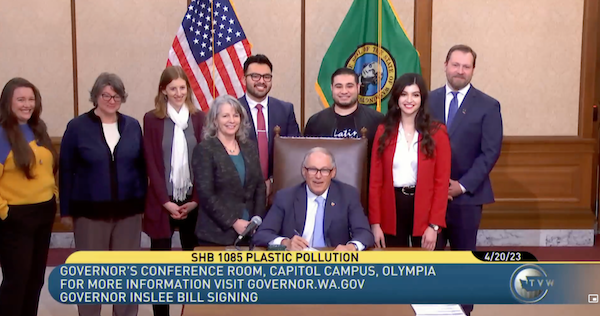
Elected leaders and members of our Plastic Free WA Coalition signing HB 1085 into law
While we love the bottom-up grassroots approach to fighting plastic pollution that beach cleanups and our Ocean Friendly Programs offer, what we need is policy solutions that prevent these products from being manufactured in the first place. One of the most effective ways to do that is to pass Extended Producer Responsibility, which essentially makes the producers of those products pay for the end-of-life, thus incentivizing them to make reusable, compostable, or truly recyclable products. While our EPR bill, the WRAP Act, did not pass this session, we did succeed in passing what we called our Trifecta Plastics Bill - HB 1085. This bill, sponsored by Representative Sharlett Mena (D-Tacoma), passed with broad bipartisan support in both the House and the Senate. It reduces plastic in three new ways: 1) it requires new buildings constructed with water fountains to also contain bottle filling stations; 2) it phases out the use of small plastic containers, wrappers, and packaging for personal care items like soaps and shampoo by hotels and other lodging establishments; 3) it bans soft film-wrapped floats and docks and mandates a study of hard-shell foam-filled floats and docks.
While HB 1085 is an important step, we still need a comprehensive policy to overhaul how we manage waste in Washington. We will continue the fight for EPR next session, so stay tuned for ways you can take action!
Coast & Climate Initiative: Protecting Our Playground
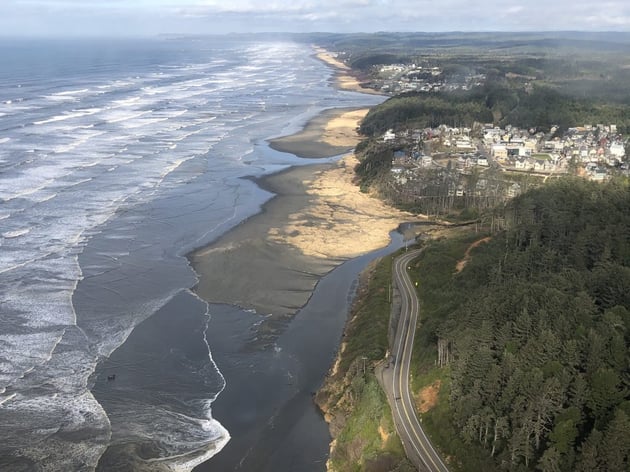
Preserving our coastlines for future generations remains at the heart of Surfrider Washington's mission. Through strategic partnerships, advocacy, and community engagement, we've made significant strides in coastal conservation. During the 2023 legislative session, we achieved two huge coastal victories with the passage of HB 1181, an update to the Growth Management Act that will ensure we are reducing emissions and planning for climate change and sea level rise, as well as fully funding the Dept. of Ecology's $3.9 million Coastal Hazards Planning Package. We're stoked that Washington is leading the way on coastal resilience and look forward to building on this momentum going forward.
Ocean Protection: Conserving Our Marine Resources
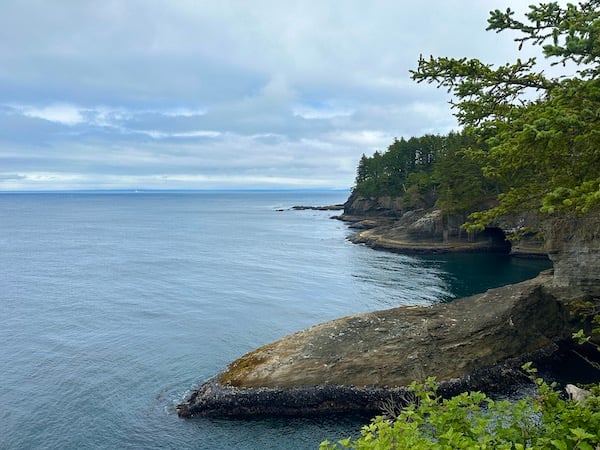
Surfrider Washington has been actively working to strengthen the Olympic Coast National Marine Sanctuary (OCNMS) during their 10-year review and update. Earlier this year, NOAA released its decadal Condition Report and invited input from the public. The Surfrider Foundation submitted a letter with our recommendations for the updated management plan that emphasized the need for science-based protections for sanctuary species, habitats, and ecological functions, and encouraging sustainable human uses. The OCNMS is home to some of the Pacific Northwest’s most productive waters, so the updated plan must address the threats of climate change, harmful resource extraction, invasive species, hazardous vessel traffic, and water, plastic, and noise pollution. As a member of the OCNMS Advisory Council, Surfrider has an important seat at the table to advocate for our members and their priorities. We will continue to support efforts to strengthen the Sanctuary program and its mission at the local and federal levels, including advocating for federal funding to support our Sanctuaries and their staff.
Clean Water: Protecting Public Health One Sample at a Time
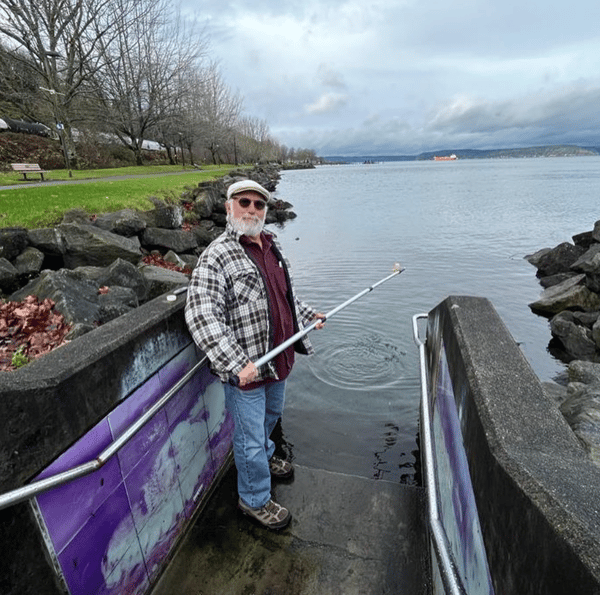
Protecting public health - all in a day's work for our BWTF volunteers!
Surfrider Washington's Blue Water Task Force Program continues to recover from the pandemic as well. Many of our labs were shut down, but we're fortunate to live in a state where our county health departments, local governments, the Dept. of Ecology's BEACH Program, and our volunteers all work together to monitor our coastal waters for harmful bacteria and ensure the public is notified when it's not safe to swim. This year, our chapters tested over 250 samples from 18 beaches. To see the results and for more info on where we sample both in Washington and beyond, head to our Blue Water Task Force page.
Celebrating Success
 Left to right: Stena Troyer, Grace Schamber, Christine Rayburn
Left to right: Stena Troyer, Grace Schamber, Christine Rayburn
It goes without saying that we could not do this work without the tireless efforts of our volunteers. While there isn't enough room on the page or time in a day to list all you amazing humans and the incredible work you accomplish, we do our best to shine a spotlight on you when we can. This year, several of our Washington activists were highlighted on our national Activist Spotlight page - shout out to Stena Troyer, Grace Schamber, and Christine Rayburn for making waves!
A Rising Tide of Activism
It's amazing to see our network here in Washington continue to grow, and even more amazing when you zoom out and see what these local efforts add up to on a national scale.
- Surfrider helped increase funding for the BEACH Act, securing $10.619 million in funding for fiscal year 2023. Our goal for next year is to increase this number, to ensure States have the resources to provide more public health protection at the beach, rather than continuing to roll back their programs.
- More than 28,000 Surfrider volunteers attended over 1,000 beach cleanups this year, removing 200,000 pounds of trash from local beaches, watersheds, and public areas.
- Surfrider’s Blue Water Task Force helped keep beachgoers safe by gathering and testing over 7,500 water samples at over 500 sites throughout the United States.
- Surfrider’s network of over 200 chapters and student clubs continues supporting their communities’ conservation efforts throughout the coastal and Great Lakes regions. And our student club network is actively developing and deploying the next generation of ocean-focused activist leaders.
- Surfrider engaged over 40,300 volunteers, with 16,000+ new first-time volunteers getting their hands dirty for a good cause at beach cleanups, water testing sites, and living shoreline restoration projects.
- This year we were able to continue efforts to designate and strengthen existing National Marine Sanctuaries from coast to coast, including the Florida Keys, Olympic Coast (WA), Northeast Canyons & Seamounts, Channel Islands (CA), and Papahānaumokuākea (HI).
Looking Ahead: A Sea of Opportunities
As we float into 2024, Surfrider Washington is brimming with optimism and determination. Our goals include expanding our outreach, deepening community connections, and continuing to be a powerful force for positive change.
Thank you, Surfrider Washington community, for a remarkable year of collective action, hard work, hearty gut laughs, inspirational levels of passion and dedication, and unforgettable moments. Here's to riding the waves of change together, making a positive impact, and ensuring clean water and healthy beaches for all people.
Cheers to the Surfrider Washington crew!
